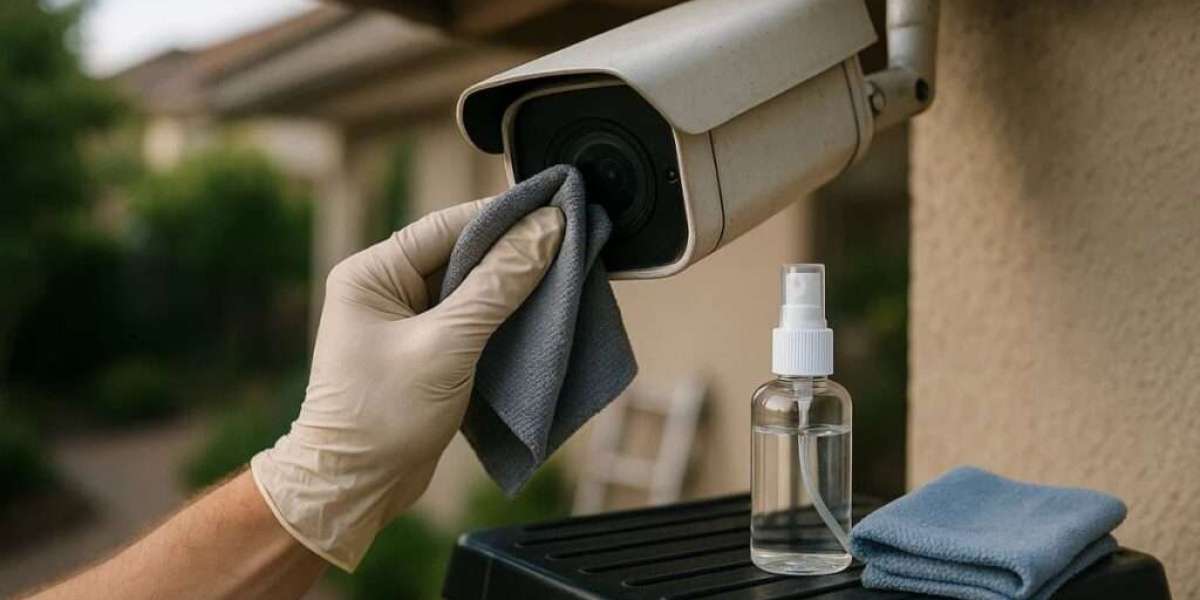1. Why Cleaning CCTV Cameras Matters
Over time, CCTV cameras collect dust, moisture, and grime that reduce image quality. A dirty lens can blur crucial details, especially at night or during bad weather. Regular cleaning ensures your footage stays sharp and clear, helping you monitor your property effectively. Whether it's for your home or business, camera clarity is essential for accurate video evidence and enhanced security coverage.
2. Understanding the Components of Your CCTV Camera
Before cleaning, it’s important to know the main components: the lens, housing, mount, and sensor cover. Each part plays a vital role in image clarity and protection. The lens captures the image, while the housing shields it from dirt and moisture. Handling these parts correctly ensures safe maintenance without damaging delicate internal systems.
3. Common Causes of Dirty CCTV Lenses
Outdoor CCTV systems are constantly exposed to dust, insects, bird droppings, and pollution. Indoor cameras can also gather fingerprints or cooking vapors. Weather conditions like rain and wind further accelerate lens buildup. Recognizing these factors helps you plan regular maintenance intervals and avoid long-term visibility problems.
4. Safety First – Power Off Before Cleaning
Always turn off the CCTV system before cleaning. This prevents electrical hazards and accidental short circuits. Unplug the power source or switch off the DVR/NVR system. It’s a simple but crucial safety measure that protects both you and your equipment from potential damage.
5. Tools You’ll Need for Effective Cleaning
Gather the right materials before starting. You’ll need a soft microfiber cloth, lens cleaning solution, cotton swabs, and compressed air. Avoid rough fabrics, paper towels, or strong chemicals that can scratch the lens or damage the housing. Using proper tools helps maintain the integrity and longevity of your camera.
6. Step-by-Step: Cleaning the CCTV Camera Lens
Start by blowing away dust using compressed air. Next, apply a few drops of lens cleaner to a microfiber cloth (never directly on the lens). Gently wipe in circular motions to remove dirt and smudges. Finally, use a dry part of the cloth to polish the surface. This ensures the camera captures clear and crisp images every time.
7. Cleaning the Camera Housing and Bracket
The outer shell and mounting bracket also need attention. Wipe them down using a slightly damp cloth to remove grime, cobwebs, or bird droppings. Avoid spraying water directly, as moisture can seep into internal circuits. Keeping the housing clean not only improves appearance but also prevents overheating caused by dust accumulation.
8. When to Seek Professional Help
If your camera is located at a height or integrated with a complex system, consider hiring experts. Professionals from Professional CCTV Installation Services in Melbourne can safely handle maintenance, ensuring your setup remains protected and functional without voiding warranties. They also inspect cables, mounts, and seals during cleaning.
9. Avoid These Common Cleaning Mistakes
Many users unknowingly damage their cameras during cleaning. Using window cleaners, alcohol, or rough wipes can cause scratches or leave residue. Avoid pressing too hard on the lens, as it can misalign the focus. Always handle cameras gently and keep water away from open connectors or sensors.
10. Maintaining Cameras During Harsh Weather
In rainy or dusty environments, increase cleaning frequency. Use weatherproof housings and protective covers to shield the lens from water spots and UV exposure. Proper maintenance helps prevent corrosion and ensures consistent performance even in extreme conditions. Always dry the camera after storms to avoid moisture buildup.
11. Benefits of Regular Maintenance
Clean cameras capture better footage, extend lifespan, and reduce repair costs. Routine upkeep also improves infrared performance for night vision systems. Clear footage enhances property protection, helps identify faces, license plates, and movement accurately. Consistent maintenance ensures you always get the most out of your surveillance investment.
12. Using Anti-Fog and Waterproof Coatings
In humid areas, fog or condensation can cloud lenses. Applying an anti-fog coating or waterproof spray helps maintain clear visibility. Make sure to use products made specifically for optical surfaces. This small step prevents internal moisture damage and ensures reliable performance in all weather conditions.
13. When to Replace Instead of Clean
Sometimes, no amount of cleaning can restore clarity. If your camera shows distortion, condensation inside the housing, or cracked lenses, it may be time for replacement. Upgrading to newer models, such as those available at Security Cameras and Installation by Trusted Melbourne Experts , ensures better resolution and smart features like motion alerts and remote monitoring.
14. Professional Cleaning vs. DIY – Which Is Better?
DIY cleaning works well for easily accessible cameras. However, professional services offer detailed inspections, ensuring that internal components, cables, and software remain in perfect condition. A mix of both—routine DIY cleaning and periodic professional servicing—is the best way to keep your CCTV system performing at its peak.
15. Final Thoughts on CCTV Camera Care
Maintaining your CCTV camera isn't just about looks; it's about security performance . Regular cleaning, proper handling, and timely maintenance ensure that your surveillance never fails when it matters most. With the right care, your system will provide clear footage, protect your property, and function flawlessly for years.
? FAQs About Cleaning CCTV Cameras
1. How often should I clean my CCTV cameras?
Clean every 2–3 months for indoor cameras and once a month for outdoor cameras exposed to weather.
2. Can I use regular glass cleaner on camera lenses?
No, household avoid cleaners. Use lens-safe solutions designed for optical glass only.
3. What if water gets inside my camera?
Turn it off immediately and let professionals handle drying and inspection to prevent damage.
4. Should I clean cameras during rainy weather?
No, wait until dry conditions to ensure safety and prevent moisture from entering the system.
5. Can I remove the camera from its mount to clean?
Only if you're experienced. Otherwise, contact a qualified CCTV technician to avoid misalignment.
6. Why is my footage still blurry after cleaning?
This may indicate internal damage, condensation, or focus misalignment that requires expert servicing.








